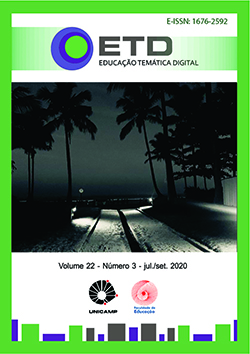Abstract
Understanding higher education is a complex task. One of the factors that characterizes such complexity is the relationship between different socioeconomic levels that impact in higher education. In the contemporary concert, the global level has been a strong interference in higher education (AUTHOR, 2019a) and gives a marked importance to internationalization, which has led us to analyze conceptions and proposals from international organizations, for this level of education. This understanding is configured in an umbrella with its multiple sticks, constituting a shelter from the weather of a global world that faces traditional university models and 21st century university models that live with configurations of emerging contexts. (AUTHOR, 2014). To address this factor, we analyzed global and regional perspectives, the latter focused on Latin America and the Caribbean, for obvious reasons and, we raised considerations to (re) think the Internationalization of Higher Education. The text has the character of identifying, selecting and systematizing proposals from emblematic international organizations for higher education, extracted from official documents and available online, through qualitative analysis.
References
BRUNDTLAND, Gro Harlem et al. Our common future: report of the 1987 World Commission on Environment and Development. Oxford: Oxford Univ., 1987.
GUILE, David. O que distingue a economia do conhecimento? Implicações para a educação. Cadernos de Pesquisa, São Paulo, v. 38, n. 135, p. 611-636, set./dez. 2008.
MEDINA, Tahina Ojeda. Introducción. La cooperación Sur-Sur en América Latina y el Caribe: balance de una década (2008-2018). In: MEDINA, Tahina Ojeda; MUÑOZ, Enara Echart (Org.). La cooperación Sur-Sur en América Latina y el Caribe: balance de una década (2008-2018). Buenos Aires: CLACSO, 2019. E-book. p. 15-40.
MENTGES, M.; MOROSINI, M. Educação superior na ibero-américa: sinal dos tempos. In: MOROSINI, M. CERDEIRA, L. Educação superior em contextos emergentes: complexidade e possibilidades na universidade. Portugal: Educa, 2019. p. 155-176.
MOROSINI, M. Como internacionalizar a universidade: concepções e estratégias. In: MOROSINI, M. (Org.). Guia para a internacionalização universitária. Porto Alegre: EdiPucrs, 2019. Disponível em: http://editora.pucrs.br/livro/1838. Acesso em: 01 nov. 2019. p. 11-28.
MOROSINI, M. Educação superior na América Latina e Caribe: internacionalização e integração acadêmica. In: CONFERÊNCIAS UFRGS, 1., 2017, Porto Alegre. Palestras [...]. Porto Alegre: UFRGS, 2017. Disponível em: https://www.ufrgs.br/cres2018ufrgs/marilia-morosini-discute-a-internacionalizacao-e-a-integracao-acadêmica/. Acesso em: 11 out. 2019.
MOROSINI, M. Estado de conhecimento e questões do campo científico. Educação, Santa Maria, v. 40, n. 1, p. 101-106, jan./abr. 2015.
MOROSINI, M. Internacionalização do currículo: produção em organismos multilaterais. ROTEIRO, Joaçaba, v. 43, n. 1, p. 115-132, jan./abr. 2018. Disponível em: https://portalperiodicos.unoesc.edu.br/roteiro/article/view/13090. Acesso em: 15 out. 2019.
MOROSINI, M. Qualidade da educação superior e contextos emergentes. Avaliação, Campinas, v. 19, n. 2, p. 385-405, 2014. Disponível em: https://www.scielo.br/scielo.php?pid=S1414-40772014000200007&script=sci_abstract&tlng=pt. Acesso em: 11 out. 2019.
OECD. Trends Shaping Education 2019. Paris: OECD Publishing, 2019. Disponível em: https://www.oecd-ilibrary.org/education/trends-shaping-education_22187049 . Acesso em: 8 nov. 2019.
OECD. OECD Future of Education and Skills 2030. [S. l.]: OECD, 2015. Disponível em: https://www.oecd.org/education/2030-project/about/. Acesso em: 5 ago. 2019.
PERROTTA, Daniela Vanesa. Universidad, internacionalización e integración regional: la lucha por un proyecto latinoamericanista de universidad hacia la CRES 2018. In: SUASNABAR, Claudio et al. Balance y desafíos hacia la CRES 2018. Buenos Aires: IEC - CONADU/CLACSO/UMA, 2018. p. 163-174. (Aportes para pensar la Universidad Latinoamerica, Cuaderno 1.).
RYCHEN, Dominique Simon. E2030 conceptual framework: key competencies for 2030 (DeSeCo 2.0). Beijing: OECD Publications, 2016. Disponível em: https://www.oecd.org/education/2030-project/about/documents/. Acesso em: 8 nov. 2019.
SANCHÉZ VEGAS, Saadia. Educación para transformar vidas. In: CONFERENCIA INTERNACIONAL SOBRE EL FUTURO DE LA EDUCACIÓN “PERSPECTIVAS EN AMÉRICA LATINA”, 3., 12-14 de noviembre de 2018, Rio de Janeiro. Anais […]. Rio de Janeiro: UNESCO, 2018. Panel: Visión de Futuro.
SANTOS, Boaventura de Sousa; MENESES, Maria Paula (Org.) Epistemologias do sul. São Paulo: Cortez, 2010.
SORIANO, Luz Inmaculada Madera. Educación y desarrollo sostenible al 2030: internacionalización de la formación docente en América Latina y el Caribe. In: GACEL-ÁVILA, Jocelyne (Org.). CRES2018: Educación superior, internacionalización e integración en América Latina y el Caribe. Balance regional y prospectiva. Córdoba: IESALC/UNESCO, 2018. p. 89-111.
UNESCO. Educação 2030: Declaração de Incheon e Marco de Ação para a implementação do Objetivo de Desenvolvimento Sustentável 4: assegurar a educação inclusiva e equitativa de qualidade, e promover oportunidades de aprendizagem ao longo da vida para todos. [S. l.]: UNESCO, 2016b. Disponível em: https://unesdoc.unesco.org/ark:/48223/pf0000245656_por. Acesso em: 9 nov. 2019.
UNESCO. Educação 2030: Declaração de Incheon e marco de ação, rumo a uma educação de qualidade, inclusiva e à educação ao longo da vida para todos. Brasília, DF: UNESCO, 2016a. Disponível em: https://unesdoc.unesco.org/ark:/48223/pf0000243278_por. Acesso em: 10 nov. 2019.
UNESCO. Educação para a cidadania global: preparando alunos para os desafios do século XXI. Brasília, DF: UNESCO, 2015. Disponível em: https://unesdoc.unesco.org/ark:/48223/pf0000234311 . Acesso em: 8 nov. 2019.
UNESCO. Educação para a cidadania global: tópicos e objetivos de aprendizagem. Brasília, DF: UNESCO, 2016c. Disponível em: https://unesdoc.unesco.org/ark:/48223/pf0000244826 . Acesso em: 8 nov. 2019.
UNESCO. Educação para a cidadania global no Brasil. Brasília: UNESCO, [201-]. Disponível em: https://pt.unesco.org/fieldoffice/brasilia/expertise/global-citizenship-education . Acesso em: 8 nov. 2019.
UNESCO. International Institute for Higher Education in Latin America and the Caribbean (IESALC). Declaración. Córdoba: UNESCO, 2018a. Declaração proveniente da III Conferência Regional de Educación Superior para América Latina y el Caribe (CRES), realizada em 14 de junho de 2018 na cidade de Córdoba. Disponível em: https://www.unicamp.br/unicamp/sites/default/files/2018-07/doc_declaracaoCRES_2018.pdf. Acesso em: 12 nov. 2019.
UNESCO. International Institute for Higher Education in Latin America and the Caribbean (IESALC). Plan de Acción 2018-2028. Córdoba: UNESCO, 2018b. Plano de ação proveniente da III Conferencia Regional de Educación Superior para América Latina y el Caribe (CRES), realizada em 14 de junho de 2018 na cidade de Córdoba. Disponível em: https://drive.google.com/file/d/1Mr_obMED-yv2RalSeC6L1YeStb1C9tiU/view . Acesso em: 5 ago. 2019.
UNESCO. International Institute for Higher Education in Latin America and the Caribbean (IESALC). Sobre el IESALC. Venezuela, [2019?]. Disponível em: https://www.iesalc.unesco.org/sobre-el-iesalc/. Acesso em: 12 nov. 2019.
YOUNG, Michael et al. Preliminary reflections and research on Knowledge, Skills, Attitudes and Values necessary for 2030. Beijing: OECD Publications, 2016. Disponível em: https://www.oecd.org/education/2030-project/about/documents/. Acesso em: 8 nov. 2019.
The ETD - Digital Thematic Education uses the Creative Commons license (CC), thus preserving the integrity of the articles in an open access environment.


